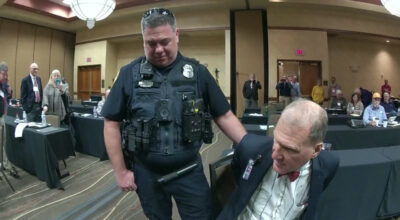



SPARTA, Tenn., Wednesday Aug. 9, 2023 — It has come to my attention that this Honorable Court most recently denied the petition of Arthur Jay Hirsch in which he raised a constitutional challenge to the Clerk’s application of Appellate Court Rule 6(A) which, he contends, is being unconstitutionally misapplied to the citizens of Tennessee in repudiatory transgression of both the Open Courts Clause of Tenn. Const. Art. I § 17 and the Transgression and Exceptions Clause of Tenn. Const. Art. XI § 16.
By Christopher Sapp / NoogaRadio midstate bureau chief
Clearly, this Court possesses original jurisdiction over the formulation, adoption, and promulgation of its own Rules as delineated and affirmed by this Court’s own mouth in Barger v. Brock, 535 S.W.2d 337. Furthermore, the Court also possesses “other jurisdiction as is now conferred by law” as recognized and declared by Tenn. Const. Art. VI § 2.
Thus, the previous per curiam Order falsely alleging that, “The jurisdiction of the Supreme Court is appellate only” demonstrates plain error, gross incompetence, or outright deception by the current custodians of this Honorable Court, thereby adversely affecting substantive constitutional rights properly belonging to Mr. Hirsch.
Moreover, both Tenn. Const. Art. XI § 16 and T.C.A. § 16-4-403 makes it abundantly and unmistakably clear that Rules promulgated by the Judicial branch of government shall be consistent with provisions of the U.S. Constitution as well as those contained within the Tennessee Constitution.
”The declaration of rights hereto prefixed is declared to be a part of the Constitution of the state, and shall never be violated on any pretense whatever. And to guard against transgression of the high powers we have delegated, we declare that everything in the bill of rights contained, is excepted out of the general powers of the government, and shall forever remain inviolate.” Tenn. Const. Art. XI § 16
“The rules prescribed by the supreme court pursuant to § 16-3-402 shall not abridge, enlarge or modify any substantive right, and shall be consistent with the constitutions of the United States and Tennessee.” T.C.A § 16-4-403
Therefore, in exercise of my Tenn. Const. Art. I § 23 right of remonstrance, I respectfully urge and implore each of you, as my duly elected and appointed representatives within the Judicial branch, who, being currently clothed with the powers of government, ought pause in retrospective contemplation of the prior precedents of this Court. At the same time, I would gently remind each you of the oath of office taken upon your investiture and ask your gravest consideration of Mr. Hirsch’s Motion for Reconsideration in challenge to the Rules, just as the Court has previously, and unequivocally, invited him do pursuant to its decision in Barger.
Furthermore, what are the People to do, if the delegated “high powers” become too high-minded, obstinate, or unwilling to comport themselves to the constitutional constraints and limitations imposed on their respective offices as explicitly prohibited by Tenn. Const. Art. XI § 16 when such usurpations unequivocally transgress the “inviolate” Declaration of Rights contained in Tenn. Const. Art. I, which the People have expressly excepted and unilaterally reserved unto themselves?
As a final sober reminder, it is the sworn constitutional and fiduciary duty of each Justice of this Honorable Court to either grant Mr. Hirsch’s requested relief by entertaining his original question, or, to grant a full, fair, and impartial hearing on his Motion for Reconsideration at your earliest convenience, the public faith, trust, and confidence in the judiciary requiring it.

